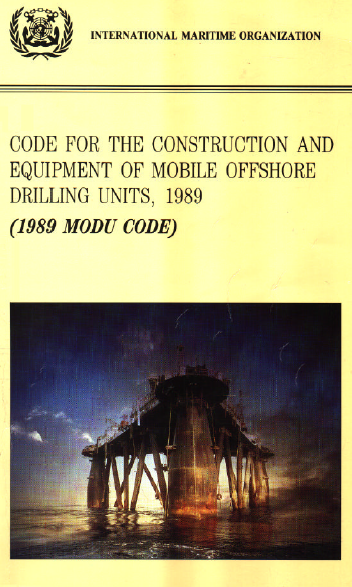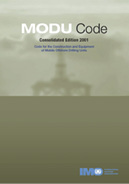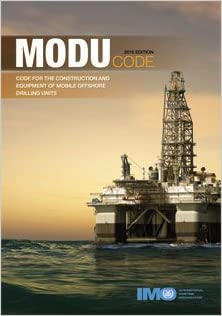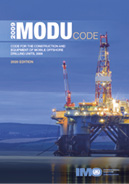The Drill Down, Issue #20: The MODU Codes
 Introduction
Introduction
Previous issues of the Drill Down (issue numbers 3, 4 and 18) explored Mobile Offshore Drilling Units (MODUs) and the regulatory requirements to operate on the U.S. Outer Continental Shelf. In this issue, we will take a look at the various MODU Codes adopted by the International Maritime Organization (IMO) and their applicability.
Note: Hyperlinks in the text open the linked document or informational web page.
The MODU Codes [1]
There are three IMO MODU Codes with four major applicability dates relating to the date that a MODU was constructed (i.e., date the keel was laid or the unit was at a similar stage of construction):
- The Code for the Construction and Equipment of Mobile Offshore Drilling Units, known as the MODU Code and commonly referred to as the 1979 MODU Code:
- applicable to MODUs constructed on or after 31 December 1981
- The Code for the Construction and Equipment of Mobile Offshore Drilling Units, 1989, also known as the 1989 MODU Code:
- applicable to MODUs constructed on or after 01 May 1991
- The Code for the Construction and Equipment of Mobile Offshore Drilling Units, 2009, also known as the 2009 MODU Code:
- applicable to MODUs constructed on or after 01 January 2012
- 2016 and 2017 amendments are only applicable to MODUs constructed on or after 01 January 2020
Note: Any existing unit that complies with the requirements of a specific Code is eligible for issuance of a certificate under that Code. For example, a unit that was built prior to the implementation of the 1979 MODU Code (e.g. keel laid date of September 1977) can be issued a MODU Safety Certificate under the 1979 Code if it meets all of the requirements in that Code. Another example is a MODU that was originally constructed to meet the provisions of the 1989 MODU Code but has undergone modifications and complies with 2009 MODU Code requirements could be issued a 2009 MODU Safety Certificate.
The Purpose of the MODU Code(s)
The MODU Code’s purpose is to “provide an international standard for mobile offshore drilling units of new construction so that its application will facilitate international movement and operation of these units and result in a level of safety for such units and for personnel on board equivalent to that required for conventional ships engaged on international voyages by the International Convention for the Safety of Life at Sea, 1974 and the International Convention on Load Lines, 1966” as stated in the preamble to the 1979 MODU Code. The preambles to the subsequent MODU Codes read similarly.
The MODU Codes are used in place of SOLAS for MODUs. The Code of Safety for Special Purpose Ships is not intended to be applied in addition to the applicable MODU Code.
The MODU Codes refer to specific SOLAS regulations and additional IMO Codes such as LSA Code, FSS Code, FTP Code, and various resolutions and circulars. MARPOL applies separately.
1979 MODU Code
The MODU Code was adopted by the IMO Assembly on 15 November 1979 as Resolution.A.414(XI) (and respective corrigenda) and came into force on 31 December 1981. The MODU Code has been amended by the following:
- MSC/Circ.561 dated 03 July 1991 and effective 01 February 1992 revised the radio lifesaving requirements at 10.7 and replaced the text of Chapter 11 (radiocommunications).
- Resolution MSC.357(92) adopted 21 June 2013 and effective 01 January 2015 added enclosed space entry and rescue drills (Chapter 10) and procedures and records (Chapter 14) requirements for the same[2].
- Resolution MSC.382(94) adopted 21 November 2014 and effective 01 July 2016 added Chapter 15 with enclosed space atmosphere testing instrument and entry recommendations[2].
- Resolution MSC.504(105) adopted 28 April 2022 and effective 1 January 2024 relocated radio lifesaving appliances to Chapter 11 and requires compliance with chapter 11 of the 2009 MODU Code (resolution A.1023(26)), as amended up to and including resolution MSC.506(105).
- Resolution MSC.545(107) adopted 08 June 2023 and effective 01 January 2024 prohibits asbestos in new installation of materials and references the unified interpretation for implementation of the same.
 1989 MODU Code
1989 MODU Code
The 1989 MODU Code was adopted by the Assembly on 15 October 1989 as Resolution.A.649(16) and came into force on 01 May 1991. The 1989 MODU Code has been amended by the following:
- MSC/Circ.561 dated 03 July 1991 and effective 01 February 1992 revised the radio lifesaving requirements at 10.13 and replaced the text of Chapter 11 (radiocommunications).
- Resolution MSC.38(63) (and respective corrigenda) adopted on 19 May 1994:
- introduced the harmonized system of survey and certification (HSSC), effective 03 February 2000, and updated control actions in Chapter 1 and the model MODU Safety Certificate in the Appendix;
- provided guidelines for units with dynamic positioning (DP) systems, effective 01 July 1994; and
- replaced the text of Chapter 13 (helicopter facilities), also effective 01 July 1994.
 Resolution MSC.39(63) adopted on 19 May 1994 extended the Code on Alarms and Indicators to MODUs and provided amendments for the same. Resolution A.830(19) adopted on 23 November 1995 revoked MSC.39(63) and adopted the Code on Alarms and Indicators, 1995 (the Code is in the resolution’s Annex).
Resolution MSC.39(63) adopted on 19 May 1994 extended the Code on Alarms and Indicators to MODUs and provided amendments for the same. Resolution A.830(19) adopted on 23 November 1995 revoked MSC.39(63) and adopted the Code on Alarms and Indicators, 1995 (the Code is in the resolution’s Annex).- Resolution MSC.187(79) adopted on 09 December 2004 and effective 01 July 2006 amended the model MODU Safety Certificate by adding the completion date of the survey for which the certificate is based.
- Resolution MSC.358(92) (and respective corrigendum) adopted 21 June 2013 and effective 01 January 2015 added enclosed space entry and rescue procedure with drills and records requirements for the same[2].
- Resolution MSC.383(94) adopted 21 November 2014 and effective 01 July 2016 added enclosed space atmosphere testing instrument and entry recommendations[2].
- Resolution MSC.505(105) adopted 28 April 2022 and effective 1 January 2024 relocated radio lifesaving appliances to Chapter 11 and requires compliance with chapter 11 of the 2009 MODU Code (resolution A.1023(26)), as amended up to and including resolution MSC.506(105).
- Resolution MSC.546(107) adopted 08 June 2023 and effective 01 January 2024 prohibits asbestos in new installation of materials and references the unified interpretation for implementation of the same.
The printed edition of the ’89 MODU Code is available as the 2001 Consolidated Edition (pictured right).
2009 MODU Code
 The 2009 MODU Code was adopted by the Assembly on 02 December 2009 as Resolution.A.1023(26) (and respective corrigendum) and came into force on 01 January 2012. The ’09 MODU Code has been amended by the following:
The 2009 MODU Code was adopted by the Assembly on 02 December 2009 as Resolution.A.1023(26) (and respective corrigendum) and came into force on 01 January 2012. The ’09 MODU Code has been amended by the following:
- Resolution MSC.387(94) adopted 18 November 2014 and effective for units constructed on or after 18 November 2014 added a new subparagraph related to alternate
methods for lifeboat drills on MODUs.
- Resolution MSC.359(92) (and respective corrigendum) adopted 21 June 2013 and effective 01 January 2015 added enclosed space entry and rescue procedures with drills and records requirements for the same[2].
- Resolution MSC.384(94) adopted 21 November 2014 and effective 01 July 2016 added enclosed space atmosphere testing instrument and entry recommendations[2].
2009 MODU Code: 2020 Edition
 The 2020 Edition of the 2009 MODU Code is the most recent consolidated edition of the ’09 MODU Code. This edition incorporates the 2013, 2014 and 2016 amendments that were previously discussed (MSC.359(92), MSC.384(94) and MSC.387(94), respectively) plus the following amendments:
The 2020 Edition of the 2009 MODU Code is the most recent consolidated edition of the ’09 MODU Code. This edition incorporates the 2013, 2014 and 2016 amendments that were previously discussed (MSC.359(92), MSC.384(94) and MSC.387(94), respectively) plus the following amendments:
- Resolution MSC.407(96) adopted 19 May 2016 and effective for units under construction on or after 01 January 2020 added FSS Code foam firefighting appliances compliance.
- Resolution MSC.435(98) adopted 09 June 2017 and effective 01 January 2020 added requirements from the findings associated with the MODU Deepwater Horizon incident to include:
- H-Class divisions;
- DP shutdowns during emergency drilling conditions;
- hazardous area electrical installations maintenance, qualifications and records;
- drill floor firefighting;
- lifesaving weight increases and dedicated rescue boats;
- designation of the master (when assigned) as the person in charge “at all times”; and
- man overboard and davit-launched liferaft drills.
- Resolution MSC.506(105) adopted 28 April 2022 and effective 1 January 2024 relocated radio lifesaving appliances to Chapter 11 and replaced the text of Chapter 11 (radiocommunication and navigation).
- Resolution MSC.547(107) adopted 08 June 2023 and effective 01 January 2024 prohibits asbestos in new installation of materials and references the unified interpretation for implementation of the same.
Important note: While several of the 2017 amendments are “operational” in nature, all amendments that are effective on 01 January 2020 are only “required” for MODUs constructed on or after that date (i.e., not “all-ships” cites).
Two printed editions of the 2009 MODU Code are currently in circulation/available: the 2010 Edition and the 2020 Edition (both pictured in the respective sections above).
Conclusion
As with other international instruments, build (constructed/keel laid) dates are a crucial factor in determining the MODU Code (’79, ’89 or ’09) and the respective amendments that apply to an individual MODU.
The timeline that follows provides a visual representation for the dates associated with the MODU Codes and their amendments.